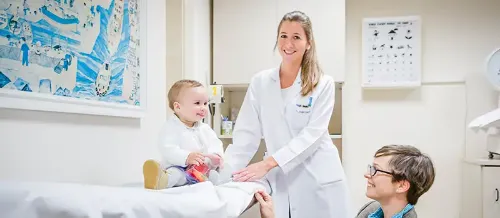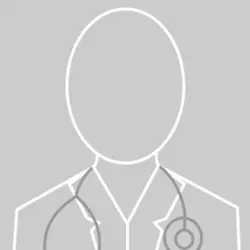Tourette's Disorder
"It is important that a neuropediatrician evaluate the child to assess whether there are any other neurological problems and treat the problems associated with this disease".
DR. ROCÍO SÁNCHEZ-CARPINTERO ABAD
DIRECTOR. NEUROPEDIATRICS UNIT

What is Tourette's disorder?
Tourette's disorder is defined as a disease in which there are several motor tics and one or more vocal tics, several times a day, almost every day, for more than a year, and there is no 3-month period without tics.
The upheaval causes remarkable malaise or significant social deterioration, labor, or in other areas, and appears before the 18 years.
It is usually more frequent in boys than in girls in a proportion of up to 3 boys for every affected girl.
It is important to point out that the presence of an isolated tic during a short period of time is very frequent in children (up to 12% of children have them at some time) and it generally resolves without treatment after a few months. If they do not improve, a doctor should be consulted.

What are the symptoms of Tourette's disorder?
Up to 25-50% of children with Tourette's disorder have symptoms of impulsivity, hyperactivity and attention deficit.
Although it can last all the life, with ups and downs in its frequency and intensity, many patients with tics improve after the adolescence. The worsening coincides with periods of greater stress or anxiety.
In the autoimmune forms it worsens after infections by estreptococo (pharyngitis and colds) during the autumn and winter.
The most common symptoms are:
- Motor tics.
- Vocal tics.
Do you have any of these symptoms?
You may have a Tourette's disorder
What are the causes of Tourette's disorder?
The cause is not known, although it is known that there is no influence of the socioeconomic level, and that there are genetic factors involved, since up to 2/3 of the relatives of children with Tourette's disorder have some type of tic. There is also a relationship between Tourette's disorder and obsessive-compulsive disorder.
In 33% of children with Tourette's disorder, the disorder may be due to an autoimmune process, triggered by a pharyngitis type infection, or upper respiratory tract infection by beta-hemolytic strep A. It is believed that the antibodies against this bacterium that the child produces damage the area of the brain of the basal ganglia and this damage produces the tics.
Also there is relation between the disorder of Tourette and other diseases, like some types of anxiety and the nervous anorexia. In the children with Tourette's disorder the rest of the development usually is normal.
What is the prognosis?
Regarding the course of the disease, it appears in childhood and rarely after puberty.
The child's evaluation should be followed by a specialist in this field, such as a pediatrician, neuropediatrician, neurologist or child psychiatrist, to rule out other disorders such as attention-deficit hyperactivity disorder, obsessive-compulsive disorder and learning disabilities.
In many occasions, they are the comorbid disorders that accompany the tics, like the TDAH, those that but cause problems, not as much the tics in himself. Also a neurological examination must be made to discard other motor problems, and sometimes an electroencephalogram is made to discard convulsions called mioclónicas, and analysis to see if there are antibodies antiestreptococo.
How is Tourette's disorder diagnosed?

The disorders by Tics and the disorder of Tourette in children, usually are evaluated by the pediatrician or neuropediatra.
Nevertheless, as these disorders often are comorbid (or are accompanied by) other psychiatric disorders, generally also they are seen by the child and adolescent psychiatrist.
Something similar happens in adults, as they are seen by the neurologist and also by the psychiatrist.
A complete neurological examination should be performed and an electroencephalogram may be necessary to rule out seizures called myoclonic seizures, and testing for anti-Streptococcal antibodies.
How is Tourette's disorder treated?
With regard to treatment, it should focus on suppressing or reducing symptoms, supporting the child's adaptation and favoring his or her developmental process.
Comorbidity should be treated when it exists. There are several types of medication that are used and improve Tourette's disorder. The main drugs in the treatment of Tourette's disorder are neuroleptics such as haloperidol, pimozide, risperidone and olanzapine, with improvement being observed in up to 60-80% of the children treated.
Another non-neuroleptic drug that can help is clonidine, with a response of up to 50%, although it should be used with care because it can cause heart problems and hypotension.
Treatment should be individualized and followed up to see if symptoms improve or if adverse effects occur.
Where do we treat it?
IN NAVARRA AND MADRID
The Neuropediatrics Unit
of the Clínica Universidad de Navarra
The Unit is part of the Department of Pediatrics and works closely with specialists from other departments to provide integrated care for children and adolescents with risk factors or diseases affecting the central nervous system and neuromuscular system.
It is made up of a team of neuropediatric specialists and psychopedagogues.
Diseases we treat
- Early development and its deviations.
- Motor control disorders.
- Global developmental disorders. Autism.
- Epilepsy in children. Dravet syndrome.
- Sleep disorders.
- Attention deficit and hyperactivity disorders. ADHD.

Why at the Clinica?
- Teamwork to offer a valuation in 24 hours.
- Most experienced nationally in Dravet Syndrome.





